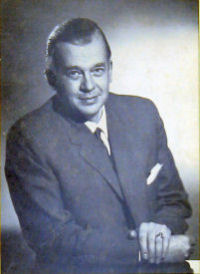E. F. Schumacher
| E.F. Schumacher | |
|---|---|

Photograph from cover of Small Is Beautiful 1973
|
|
| Born |
Ernst Friedrich Schumacher 19 August 1911 Bonn, German Empire |
| Died | 4 September 1977 (aged 66) Switzerland |
| Education | Oxford and Columbia University |
| Occupation | Economist |
Ernst Friedrich "Fritz" Schumacher (19 August 1911 – 4 September 1977) was an internationally influential economic thinker, statistician and economist in Britain, serving as Chief Economic Advisor to the UK National Coal Board for two decades. His ideas became popularised in much of the English-speaking world during the 1970s. He is best known for his critique of Western economies and his proposals for human-scale, decentralised and appropriate technologies.
According to The Times Literary Supplement in 1995, his 1973 book Small Is Beautiful: a study of economics as if people mattered was among the 100 most influential books published since World War II. It was soon translated into many languages, bringing him international fame. Schumacher's basic development theories have been summed up in the catch-phrases Intermediate Size and Intermediate Technology. In 1977 he published A Guide for the Perplexed as a critique of materialist scientism and as an exploration of the nature and organisation of knowledge.
Together with long-time friends and associates like Professor Mansur Hoda, Schumacher founded the Intermediate Technology Development Group (now Practical Action) in 1966.
Schumacher was born in Bonn, Germany in 1911. His father was a professor of political economy. The younger Schumacher studied in Bonn and Berlin, then from 1930 in England as a Rhodes Scholar at New College, Oxford, and later at Columbia University in New York City, earning a diploma in economics. He then worked in business, farming and journalism. His sister, Elizabeth, was the wife of the physicist Werner Heisenberg.
...
Wikipedia
